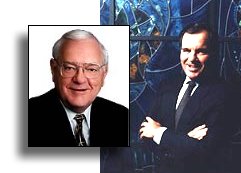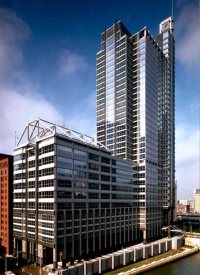 CHICAGO
CHICAGO -- The Second City wasn't second. Not in this, one of the most heated, high-profile site selections of recent vintage. "Chicago Wins! Welcome Boeing," blared the marquee fronting the Chicago Theatre.
Concluding a whirlwind seven-week process that featured a hefty dose of cloak-and-dagger intrigue, Boeing (
www.boeing.com) ended a fierce three-city tug of war by picking 250,000 sq. ft. (23,230 sq. m.) of space at 100 N. Riverside Plaza to house its relocated Seattle headquarters. Besting Dallas/Ft. Worth and Denver, Chicago gained 500 headquarters jobs (though 80 percent will likely be transfers from Seattle). Perhaps more importantly, it collected a generous chunk of location cachet.
Two business-attractin' amigos: Prior to bagging Boeing, the bipartisan combo of Republican Gov. Ryan (left) and Democratic Mayor Daley collectively marshaled $100.9 million in incentives to land Ford Motor Co.'s 1,000 new jobs and $40 million to secure Solo Cup Co.'s 1,000-job relocation.
"Today's decision confirms to the world that Chicago is a great place to live, work and do business," Mayor Richard Daley (
www.ci.chi.il.us/Mayor) said at the project's official unveiling at Midway Airport. "It tells the international business community that Chicago's economy is strong, that our leaders can work together to get things done, and that Chicago can meet the needs of any business in the world - from the largest to the smallest . . . Boeing's decision reinforces what most of us already know: Chicago has a quality of life that is unmatched by any major city in the country."
But the quality win didn't come cheaply. Illinois and Chicago ponied up a US$63 million incentive package. A substantial outlay for 500 jobs, it drew predictable criticism.
Countered Gov. George Ryan (
www.state.il.us/gov), "It's going to be a very modest investment for the state of Illinois for the money that it'll bring back." The governor cited an Arthur Andersen study that estimated Boeing could have an area economic impact of $4.5 billion over the next 20 years, with each headquarters job creating five more high-end jobs.
But there was a far less noticed major factor in landing Boeing: some frantic all-night negotiations to free up the Chicago space to house the headquarters. In the end, even the most astute location strategist still needs some real, live space in which to transform strategy into reality.
Boeing Decides to Redefine Itself
Boeing's migratory odyssey began on March 21, when the world's largest aerospace company announced it would move its headquarters from the city where it was founded in 1916. ("If it ain't Boeing, I ain't going" read bumper stickers on some Seattle vehicles.) Chairman Philip Condit decided that he wanted to distance the company's headquarters from its operating divisions, focusing headquarters' energies on new business lines and long-term growth.
"We intend to do no less than define the future of aerospace," Condit said at the Midway Airport press conference.
From the get-go, Boeing said that its headquarters was bound for either Chicago, Dallas/Ft. Worth or Denver - all listed in Fortune's 2000 top 10 "Best Cities for Business." With Boeing's reliance on military contracts and Texas' White House clout, many observers deemed Dallas/Ft. Worth the odds-on favorite.
(A notable exception: Cognetics' location guru David Birch, who predicted that quality-of-life considerations would sway things Denver's way.)
'Any of the Cities Would Have Worked'
The Texas location was indeed the apparent frontrunner in Boeing's early considerations, according to insiders. The order of the pack, though, shifted down the stretch. Boeing's site selection team ultimately picked Chicago, particularly fancying its closer proximity to Wall Street and the nation's capital.
Then there was the little matter of incentives. Illinois' $63 million package dwarfed Denver's reported $13 million to $18 million package and Dallas/Ft. Worth's $14 million.
The final decision, however, was Condit's. The Boeing chairman allowed that he'd picked the Windy City after studying "a big matrix" of each city's assets that his staff had compiled.
"It was a very difficult decision, and no single factor made the difference," Condit explained in Chicago. "We looked at three very exciting metropolitan areas in which to base our company. Each community had many positive attributes and would be a suitable location for a corporate headquarters. In the end, we looked at all the data and made what we believe is the right choice for Boeing."
Conduit said the company liked Chicago's "strong pro-business environment," its cultural diversity, easy access to the company's operations and customers and ready access to global markets. Boeing's chairman allowed that he'd wearied of long flights from Seattle to New York, Washington, D.C., and a host of other U.S. and international destinations.
Said John Warner, the senior vice president and chief administrative officer who led Boeing's site search team, "Any one of these three cities would have worked, including Seattle if it weren't co-located with our commercial airplanes headquarters."
Space Problem Almost Scuttles Deal

Boeing kept things under an airtight lid as the decision date neared. Condit told all three cities' mayors that the winner would have only four hours advance notice. Only after Boeing's corporate jet lifted off from Seattle for a then-unknown destination did Condit call the city's chiefs.
Still, last-minute troubles in securing space almost capsized the deal. Boeing's leasing agent initially hit a brick wall in trying to convince Philadelphia-based Rohm and Haas Co. (
www.rohmhaas.com) to give up its space inside 100 N. Riverside. Rohm and Haas wasn't interesting in buying out its existing long-term lease, negotiated at above-market rents of $28 per square foot.
That spurred several all-night negotiating sessions. Huddled in those feverish gatherings were Boeing's agent; Rohm and Haas; a host of lawyers and bureaucrats; Chicago-based John Buck Co., the building's leasing agent, and Lend Lease Real Estate Investments, the advisor for the Florida pension fund, which owns 100 N. Riverside. The tension had to be palpable around the negotiating table. Boeing had already announced that it had "contingency plans" that would kick in if it picked
any of the three cities.
The whole Boeing deal was almost scuttled when an existing tenant balked at giving up
the space that the aerospace power wanted inside 100 N. Riverside Plaza (pictured).

In the wee hours of May 10, the deal finally came together. City officials agreed to fork over an additional $1 million to nudge Rohm and Haas out; and the Florida pension fund agreed to let the Philadelphia chemical company walk away with no buyout on its 54-year lease. Later that day, Boeing's jet took off and Condit began making his mayoral phone calls.
Boeing reportedly signed a 15-year lease for the top 12 floors of the 36-story 100 N. Riverside. The aerospace giant will pay market-rate rent of $20 per square foot during the agreement's first year, with rent thereafter escalating 3 percent a year.
Boeing has announced Sept. 4 as the target move-in date for the Chicago headquarters.
The Incentives That Brought Down
Boeing in the Windy City
State: $41 million.
• With an extension of the state's EDGE program ( www.commerce.state.il.us/communities/edge/factsheet2.htm) from 10 to 15 years, Boeing will be able to take a tax credit that's equal to the income taxes its employees generate.
• Boeing get annual grants over the next decade will equal to half of the total employees' income taxes, which will cover up to 50 percent of Boeing's moving expenses.
• Grants for job training, technology and capital improvements are also included.
Local: $20 million.
• Although its space is leased, Boeing will receive some $1 million a year in property tax abatements over the next 20 years.
Other: $2 million (est.)
• The city will contribute another $1 million to retire the lease of Rohm and Haas, an existing tenant in the 100 N. Riverside space that Boeing will occupy.
• The city will help pay for improvements at Midway Airport's hangars that are intended to improve the efficiencies of Boeing's Chicago operations.
Still to Be Done:
• The Illinois General Assembly must still approve the EDGE tax credit program expansion, and must also okay the moving reimbursement plan and Chicago's tax abatement.
• The city agreed to establish a downtown heliport that Boeing, as well as other firms, can use to ferry executives in and out of the center city. Once included as part of the plan for the aircraft manufacturer's headquarters, the heliport will now be located at a yet-to-be-determined downtown site.
|
LOOKING FOR MORE? BROWSE THROUGH THE “TOP INCENTIVES DEALS” ARCHIVE
 PLEASE VISIT OUR SPONSOR • CLICK ABOVE
PLEASE VISIT OUR SPONSOR • CLICK ABOVE 

 Boeing kept things under an airtight lid as the decision date neared. Condit told all three cities' mayors that the winner would have only four hours advance notice. Only after Boeing's corporate jet lifted off from Seattle for a then-unknown destination did Condit call the city's chiefs.
Boeing kept things under an airtight lid as the decision date neared. Condit told all three cities' mayors that the winner would have only four hours advance notice. Only after Boeing's corporate jet lifted off from Seattle for a then-unknown destination did Condit call the city's chiefs.
